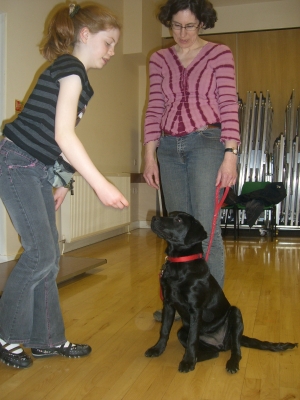You get what you pay for!!!

This concept also works very well with dogs.
Just think about how many times a day you interact or pay attention to your dog/s. Then if you exclude feeding, walking and grooming try and place the rest of the attention your dog receives into one of the two following categories: 1. Attention for doing something you don't particularly want like jumping up, raiding the garbage, chewing on the mobile phone, lying on the couch and pestering you at the dinner table or 2. Attention for doing something you want more of, like lying calmly on his bed, playing with a toy or chewing a bone?
By attention I don't only mean kisses and cuddles but it also counts as attention if you are shouting at him, chasing him around the house to get that remote back or pushing him off you when he jumps up.
If your dogs receives attention throughout the day for doing those things you don't want and he is not receiving attention when he is doing things you want, it’s no surprise then why we sometimes have a dog that 'loves' raiding the garbage or 'asking' you to play chase with him by 'picking up' the mobile phone.
By giving him a treat when he is calmly chewing on his bone or by praising your dog more when ever you find him doing something you like, should help increase the time he spends doing those activities. This means in theory he is not spending that time doing things you don't want. Also by removing the attention from the dog when he does things we don't like it may start to make it more clearer for the dog.
My student quickly learn this in the first night of class where they find that if they chat between themselves for the first few minutes of class they miss those opportunities to reward their dog for sitting calmly and looking at them. If they miss these, the dog quickly learns that it doesn’t pay to pay attention to his owners when he is around other dogs on leash and it is probably more interesting to jump and bark at his doggie friends. This is usually when the owners stop chatting and start paying attention to their dogs. If they had paid more attention to them for doing the ‘right’ thing then they probably wouldn’t have a to pay attention to the dog for the behaviour he is now offering (which is behaviour they don’t want). Also if you have a dog that is focused on you at a start of a training session that ca only be a good thing. The dogs also learning that when he is on leash it pays to remain calm and pay attention to mum and dad when around other dogs as oppose to jumping and barking at other dogs walking by. You can then generalise this to street walking and places like the veterinarians waiting room.
(In Image: Pepper the Lab with her owners in puppy class learning the basics)




